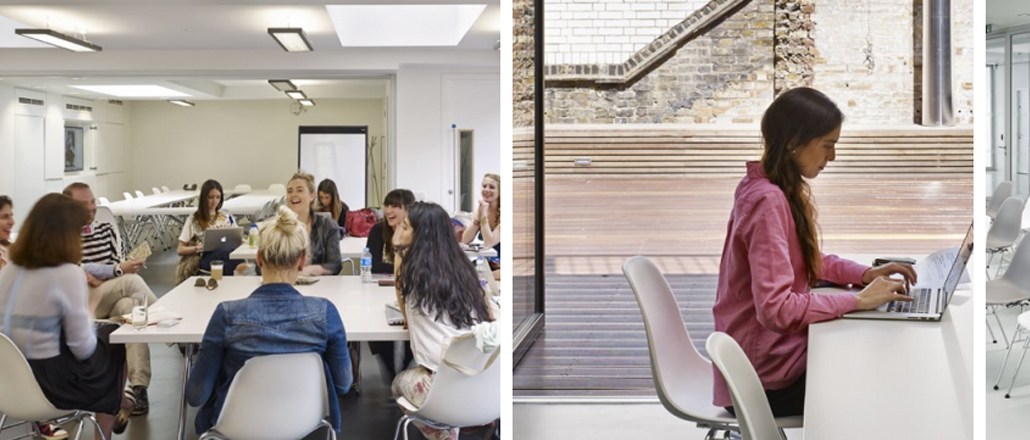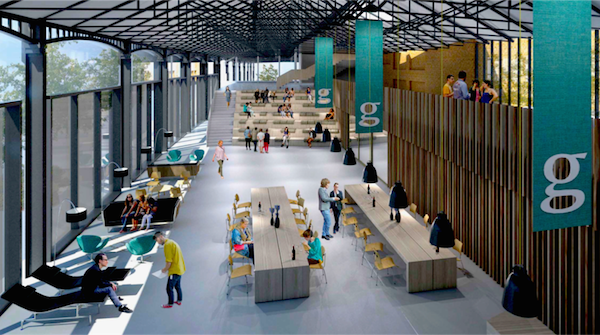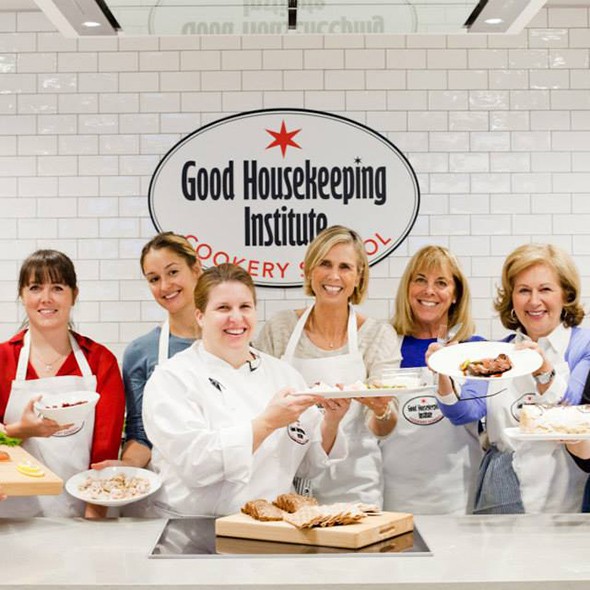Secure your place at the Digiday Media Buying Summit in Nashville, March 2-4

The digital era was supposed to mean publishers could shed expensive, pricey physical assets. Yet some publishers are putting big money into brick-and-mortar outposts, whether educational facilities or events spaces, in the hopes of wringing more value from their brands.
Publishing brands have put their names to all sorts of things in the past. For instance, Forbes licenses its name to an office building in the Philippines. But the following publishers aren’t letting others do the hard work for them. Instead, they’ve decided to invest large sums in property in central London to build their on in-house events and training businesses.
Here’s how Hearst U.K., Condé Nast U.K. and Guardian News & Media have justified their investment to buy physical outlets for their brands.
The Condé Nast College of Fashion & Design
Condé Nast College was set up in 2013 to educate those looking to get into the fashion industry. Courses include the Vogue Fashion Certificate cost £8,100 ($12,500) plus tax for 10 weeks’ tuition. The College is situated in a 12,000-square-foot space in the middle of SoHo, London, which comes with a mix of flexible rooms, studios and a roof terrace. The College also doubles as a space for events for Condé Nast U.K.’s magazine brands and is available for private events.
The investment needed to set the College up has been huge. Its 2014 report said it had spent £2.9 million ($4.4 million) on property alone, and it now has a team of 12 full-time staff running the College. Condé Nast expects it to achieve an operating profit this year, though it’ll take longer to pay off the capital investment.
“It has been a big investment, but it needed to be state of the art and feel like a seamless extension of the Condé Nast brand. But because we’ve got private owners, we’re an example of a company that can invest deep and long,” said Susie Forbes, Condé Nast College principal. “We’re excited about the business model and the direction we’re taking with it. It’s a sound model, and it complements the rest of our business really well.”
Guardian Space by Guardian News & Media
Guardian News and Media is renovating the Midlands Good Shed in King’s Cross, London, to launch Guardian Space in 2016. The 30,000-square-foot space will enable the company to run “a huge number” of Guardian Live events and act as a hub for its membership program. But such a large space would be hard for the Guardian to justify for its events alone. With that in mind, the space will also act as a hub for events offered by other cultural and educational organizations including Birkbeck, Central St Martins, Indytute and 5×15.
Its membership, which acts something like a patron plan, offers three tiers of status and access to events at a price range of £15 to £60 ($23 to $92) a month. The Guardian hasn’t released the cost of renovating the Midlands Good Shed, but its deputy CEO David Pemsel told the Media Briefing that membership and live events would contribute a significant amount of revenue over its five-year plan.
“The aim of Guardian Membership is to bring our journalism to life off both the printed and digital page, and Guardian Space will be key to achieving that,” said a Guardian News and Media spokesperson. “We hope the building will become an important new civic space for London, which will also be used to support the creation of digital content for global audiences (TED-style) as well as for broadcasting into a global community of satellite cultural spaces from Cairo to New York.”
Here’s an artist’s impression of what it could look like in 2016, along with a picture of the space as it is currently under construction:
The Good Housekeeping Institute Cookery School, by Hearst U.K.
Good Housekeeping is the U.K.’s leading monthly women’s magazine, combining lifestyle features with reviews of the latest homeware and seasonal recipes.
It has established its own public space to offer its readers cooking courses and to expand its product-testing facility. Good Housekeeping provides reviews and its famous seals of approval for a host of domestic appliances. On its digital site, users can access in-depth reviews of a vast swathe of appliances, using the additional space the company has. Its kitchen facilities double as a training space and a product-testing facility.
“The space not only strengthens our subscription proposition and our reviews: We can now run events, which makes the brand a much more tangible for our readers,” said Judith Secombe, group publishing director at Good Housekeeping. “Importantly, it’s also really helped us diversify and strengthen these alternate revenue streams.”
Image courtesy of Erika J Mitchell / Shutterstock.com
More in Media

Digiday+ Research: Dow Jones, Business Insider and other publishers on AI-driven search
This report explores how publishers are navigating search as AI reshapes how people access information and how publishers monetize content.

In Graphic Detail: AI licensing deals, protection measures aren’t slowing web scraping
AI bots are increasingly mining publisher content, with new data showing publishers are losing the traffic battle even as demand grows.

In Graphic Detail: The scale of the challenge facing publishers, politicians eager to damage Google’s adland dominance
Last year was a blowout ad revenue year for Google, despite challenges from several quarters.









